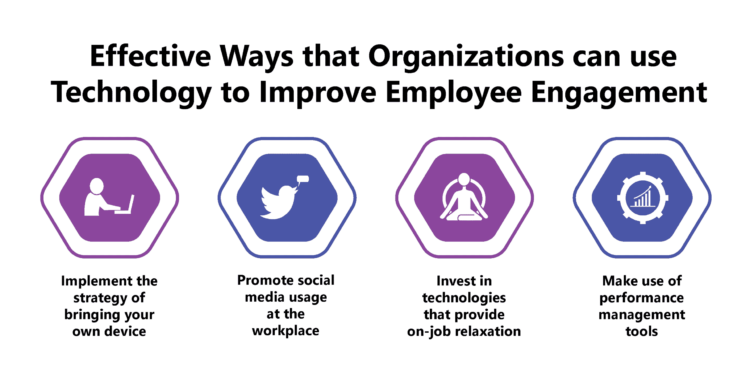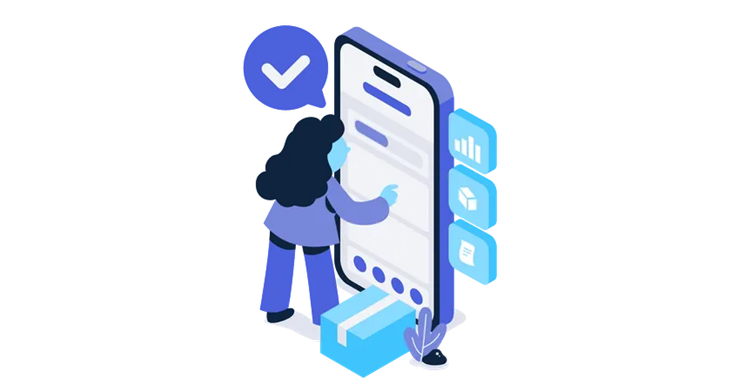1. Leverage Technology for Engagement: Organizations use APIs, gamification, and performance management software to foster social networking, improve communication, and drive employee productivity.
2. Encourage BYOD and Social Media Use: Allowing employees to use their devices and promoting social media usage enhances satisfaction, engagement, and collaboration, building a more substantial corporate brand presence.
3. Invest in On-Job Relaxation Technologies: Technologies that offer fun and stress-relief options, such as gamification techniques, help maintain energy levels and engagement, improving overall employee efficiency.
4. Utilize Performance Management Tools: Tools that set goals, assess performance, and provide feedback enhance communication and help align employee efforts with organizational objectives, boosting engagement.
Most organizations today acknowledge that employee engagement can be a potent game-changer for their businesses. Hence, it is unsurprising that organizations seek to use technology to improve employee engagement.

Even though every organization approaches employee engagement differently, most find it highly challenging.
Most progressive-minded organizations are open to adopting new tools and strategies to get better results for employee engagement.
These tools offer real-time solutions and scientifically proven engagement methodologies that match the organization’s specific and dynamic needs.

From application program interfaces (APIs) to gamification, new technologies provide organizations with a wide choice of exciting and intelligent options.
These programs ensure increased social networking and employee interaction for higher workforce productivity.
However, as Chris McGrath from Tangowork has rightly said, “Just putting the right technology in place is not enough for organizations to get better engagement results.”
Here are a few practical ways that organizations can use technology to improve Employee Engagement:


Allowing the employee to bring their device to work helps win employees’ hearts and minds.
60% of organizations today prevent employees from bringing their own devices to work, and even if they do, it is only with stringent restrictions.
It is due to the belief that using their own devices can put their businesses at risk.
However, such organizations tend to overlook the following facts about BYOD:
81% of employees use at least one personal technology tool.
30% of these employees admit that they generally disobey a policy banning the use of their own devices at work.
69% of the employees are interested in BYOD to create/use their custom apps at work.
It is quite clear that implementing BYOD can enhance the overall satisfaction level of employees and thus drive engagement.

Promoting the use of social media in the workplace is another way of integrating technology to drive engagement.
In addition to strengthening relationships between employees and their co-workers and superiors, social media can help them gain valuable information.
They can also use their profiles to create brand awareness and business promotion activities.
When employees can play a role in building the corporate brand’s social media presence, they naturally feel happy.
Since employee happiness and satisfaction directly impact their engagement levels, allowing social media usage at work is justified.

It is pretty standard for even the most dedicated and motivated employees to feel tired and depressed at work sometimes.
So, technologies that can restore employees’ energy levels in a fun and exciting way can help enhance their efficiency.
Providing employees with suitable options to have fun at work and reduce stress levels is the key to driving engagement.
Hence, organizations can opt for various gamification techniques to help employees beat deadlines or complete mundane assignments, such as playing games.

Additionally, organizations can use various performance management tools and software to set business goals and review employee performance.
These tools use various methodologies, including quizzes and polls, to assess the performance of individual employees.
Managers can then use this information to restructure the tasks being assigned to employees to enhance their efficiency and performance.
It can also improve communication between the management and the employees.
As technology and workforce environments continue to evolve, organizations need to use technology to improve employee engagement. This will help in promoting innovation and creativity besides enhancing the overall performance and reputation of organizations.

Lead author: Sagar Chaudhuri, the Co-Founder and CEO of HiFives. He is an HR Tech Evangelist with over 25 years of corporate and entrepreneurship experience. In the past, Sagar has worked in leadership roles at companies such as Genpact, Infosys, and ICICI Bank. He has an engineering degree from IIT Kharagpur and an MBA from IIM Lucknow. Connect on LinkedIn
Follow us on Twitter (@MyHiFives) to stay updated on the latest HiFives blogs and learn more about HR Best Practices on HiFives.